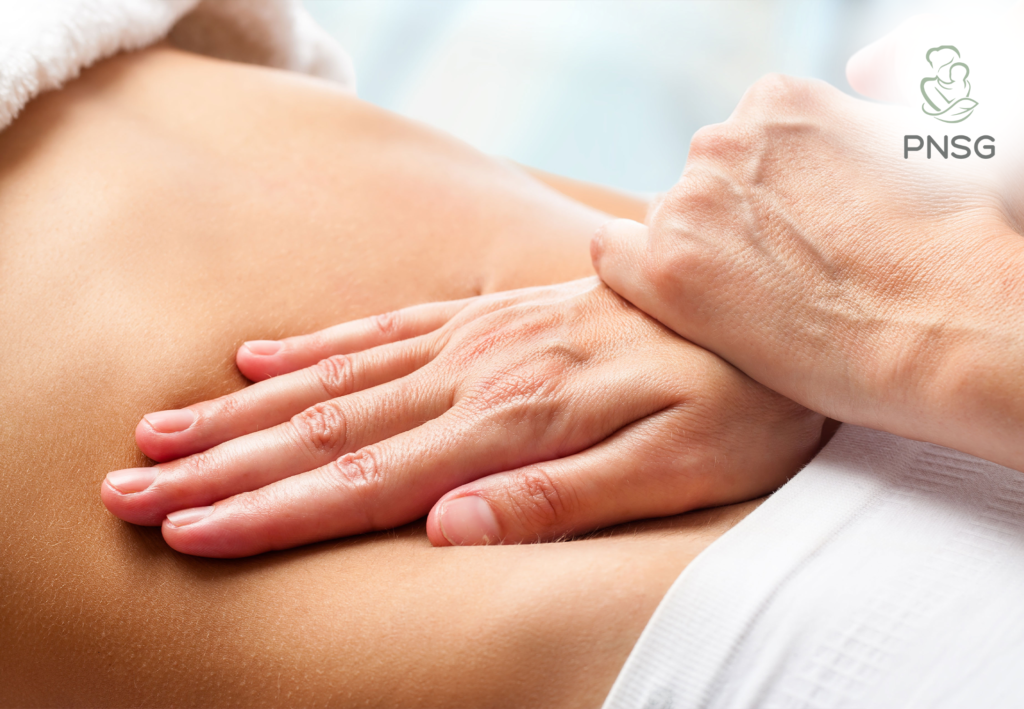7 Gambas Crescent, #09-09, Ark@Gambas, Singapore 757087 ♦ Reservation : +65 6417 9690
What Causes Postpartum Gas & How to Relieve It

Becoming a new mom is an exciting and life-changing experience. However, the postpartum period can also be full of aches, pains, and discomforts.
One of these discomforts is postpartum gas. Every new mother should understand what causes it and how to relieve it in order to make the transition into motherhood as smooth as possible.
What Causes Postpartum Gas?
There may be various causes for postpartum gas. Here are just a few of the usual suspects:
Hormones
Postpartum gas can be caused by hormones that are released during pregnancy and childbirth that relax your abdominal muscles, allowing your body to accommodate your growing baby.
This relaxation can cause a decrease in gastrointestinal motility, or muscular contraction along the digestive tract which moves food through your system.
This can lead to constipation and bloating—both of which are common causes of postpartum gas.
Additionally, hormonal shifts can also contribute to feelings of nausea, indigestion, acid reflux, and heartburn—all of which may contribute to discomfort associated with postpartum gas.
Constipation
One of the most common physical issues for women postpartum is gas. While it is easy to dismiss it as a nuisance, it is important to take note that gas can be a symptom of something bigger – such as constipation.
Constipation occurs when the muscles in the intestine move too slowly and stool can become backed up, leading to uncomfortable bloating, pain and even more gas.
It’s key for women postpartum to pay attention to what their bodies are telling them and if they have prolonged constipation or abdominal pain, reach out to a medical professional for guidance.
Taking small steps such as drinking plenty of fluids and eating food high in fibre can help alleviate the symptoms associated with constipation and hopefully postpartum gas.
Diets
Postpartum gas is a common, yet uncomfortable experience following childbirth. It can often be managed by making small changes to your diet and lifestyle.
Eating smaller, more frequent meals instead of larger meals may help ease the likelihood of painful gas building up in the stomach.
Additionally, the addition of certain probiotics like Lactobacillus acidophilus to your diet can help decrease inflammation in your gut that exacerbates gas and bloating.
Also, taking probiotic supplements can help regulate digestion which can reduce gas and other digestive problems.
Finally, drinking enough water and avoiding dehydrating beverages such as coffee or tea might be helpful as well.
All these small changes together may make a big difference when it comes to postpartum gastrointestinal issues.
Pelvic Damage
Every new mother deserves to feel comfort and assurance following the delivery of their child, however this isn’t always the case. Issues such as pelvic floor damage can cause postpartum gas that can interfere with the joys of motherhood.
Pelvic floor damage is not uncommon during childbirth and depending on its severity, can start in the form of minor pain or burning sensations which can later lead to postpartum gas.
Women should always listen to their bodies if they’re experiencing any discomfort and seek medical advice if symptoms persist, as a pelvic floor specialist will be able to identify if there has been any damage that could be contributing to postpartum gas.
Relieving Postpartum Gas
The good news is that there are several things you can do to help relieve postpartum gas. The first thing you should do is make sure you’re getting enough fluids throughout the day—at least 8 glasses of water (or other beverages like herbal teas) per day will keep your digestion running smoothly and prevent constipation from setting in.
Eating smaller meals more frequently throughout the day rather than three large meals will also help keep your digestion functioning properly.
Additionally, taking probiotics or eating probiotic-rich foods such as yoghurt may help reduce symptoms of indigestion or acid reflux related to postpartum gas.
Finally, try not to lay down after eating—try going for a walk or doing some gentle stretching instead!
All these strategies will help prevent postpartum gas from becoming a problem for new moms after giving birth!
Closing Words
Postpartum gas is an uncomfortable but normal part of being a new mom. Knowing how it’s caused and how best to relieve it can go a long way toward helping new mothers feel better after childbirth so they can better enjoy this special time with their babies!
Hold On, What About Postnatal Massages?
For women looking for additional relief from any lingering pain or discomfort associated with pregnancy and childbirth, getting a professional postnatal massage may be just what they need!
If you’re scratching your head about where to get the best postnatal massage in Singapore, well, might we go so far as to recommend PNSG?

Oh, you didn’t know that we also specialise in post delivery body massages? Well, we do! Our massage therapists offer specialised treatments specifically designed for mothers who have just given birth—so don’t hesitate to reach out if you think this might be right for you.
Should you be curious about post natal massage prices, it’ll run you anywhere from $638 for 5 sessions all the way to $1038 for 10 sessions. We hope to see you soon!









